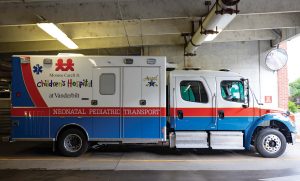‘Angel’ transport celebrates 50 years of giving critically ill children a fighting chance

For five decades, the Neonatal and Pediatric Transport team at Monroe Carell Jr. Children’s Hospital at Vanderbilt has provided safe and specialized emergency transport, 24 hours a day, for critically ill children and newborns.
Primarily serving Tennessee, southern and western Kentucky and north Alabama, highly trained care teams transport children from birth to age 21 in what essentially is a mobile intensive care unit. Monroe Carell is the only transport team in Tennessee that is certified by the Commission on Accreditation of Medical Transport Systems.
During a celebration held in August 2024, the transport team commemorated 50 years, more than 20,000 transports, and more than 5 million miles.
“What a special milestone for our Neonatal and Pediatric Transport program, sometimes affectionately known as the ‘Angel’ team,” said Meg Rush, MD, MMHC, President of Monroe Carell. “This has been a year to truly reminisce about this program not only because of this milestone but also the founders of the program who both passed away this summer: Dr. Mildred Stahlman and Dr. Angela Skelton. I am so proud of and grateful to the teams who do this care, taking our hospital expertise on the road. Countless lives have been impacted because of our ‘Angel’ team.”
The Neonatal and Pediatric Transport team consists of 50 crew members — two day-shift teams, a mid-shift team, and two night-shift teams — who make up to five calls during a 12-hour shift. The program averages about 2,000 transports annually, with about 188 a month.
“We’re prepared for all scenarios and run off protocols that are implemented as soon as we make patient contact,” said Rachel Harvill, who has been a respiratory therapist for the transport team for seven years. “We’re bringing Vanderbilt-level care to the patient in the community.”
The team currently has six ambulances in its fleet that travel by ground within 250 miles. Each is outfitted with an isolette/incubator or stretcher, a ventilator, humidified high-flow nasal cannula, a cardiac monitor and additional medical equipment and supplies to care for the hospital’s specialized patient populations.
“Once we arrive at a hospital, we usually see a sigh of relief and gratitude, and the same for us in that we’re there and able to help because a lot of these small community hospitals are doing the best they can with the resources they have,” Harvill said.
